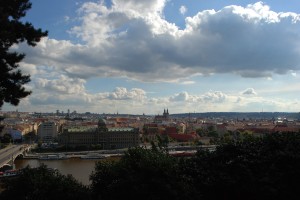Peace Through Commonality
Part of Lonnie Martin’s ongoing blog — Stranger in a Strange Land — where he tells us all about moving to Prague to drink beer and make arthouse movies for a living. His wife is also blogging about the experience.
# # #
I had expected language to be my biggest hurdle in day to day living in Prague, but communicating hasn’t been too bad. It’s a good thing too. The Czech language is extremely difficult to learn. It’s a localized ethnic language not really spoken outside of the Czech Republic, a land mass roughly the size of North Carolina. Though it has a lot in common with Polish, Slovak, and other slavic languages, no one is going to be trying to learn Czech if they’re not planning on spending some time in the country of it’s namesake.
Western tourists have created a myth that goes something like, “Oh, everybody in Prague knows English. You don’t have to learn Czech.” This isn’t exactly true. Yes, since the Velvet Revolution in 1989, every Czech student takes English in school. However, that doesn’t exactly mean it stuck. Think back to your own experience with high school Spanish or French. How much of that shit do you remember? Most Czechs understand some English, but the further you get away from the garish tourist trap that is Starom?stské Nám?stí (Old Town Square), the less likely you are to find folks that can actually speak it.
There are also many Czechs that can speak English quite well, but won’t. Their reasoning seems to be: “Hey, you’re in the Czech Republic. If you’re going to live and work here, you should learn the language.” Sound familiar, colonialist asshole?
I have two Czech phrases I yank out at the beginning of any conversation with a stranger. After the always obligatory “Dobrý den” (literally “good day”), I usually follow up with “Nerozumím ?esky moc dob?e” (“I don’t understand Czech very well.”), or “Mluvim ?esky špatn?.” (“I speak Czech badly”). In a few instances, the stranger immediately switches to English. Usually though, the individual will continue to talk to me in Czech that may or not be sprinkled with poorly pronounced English. While the resulting conversation probably sounds like a version of Waiting for Godot being performed by two idiots who think they’re speaking the same language, we usually find a way to get done whatever it is we’re trying to do.
Traveling to Europe and having to communicate in a language far removed from my native one has all but confirmed one of my long standing views on life: The human condition is universal in spite of language, culture, history, and upbringing.
I was once told by a friend whose identity eludes me right now that a city is a city is a city. New York, London, Prague, Tokyo, Moscow, and Cairo may have different local flavors, but there can be similar experiences found in all. Markets and food stands, taxis and traffic, cafes and bars; these are found in every city. Hustle and bustle knows no nationalism. The daily grind recognizes no borders. Sex, love, fear, and death all transcend the fickle nature of politics. In every city the young chase foolish dreams, and the old remember even more foolish dreams gone by.
Prague is no different from my native Washington, DC in this regard. A late tram or bus will mess up your day in either place. A cold beer with good friends at the end of that day in either city can go a long way toward making it better. Tomorrow is another day, no matter what language you speak.
My morning classes put me on the tram during the AM rush hour. It’s an amazing time to “people watch.” On public transport, you see humans at their best and worst. I’ve seen an old man with a cane give up his seat for a young mother with two children. I’ve seen two drunks get in a fight over… I don’t know, something. While I didn’t know the exact details, I didn’t need to understand Czech to get the altercation was probably over something stupid.
One morning a young blonde haired woman boarded the tram dressed in a blue one-piece dress with matching high heels and no jacket, even though it was chilly morning. She had a small rolling suitcase with her. Her make-up was fresh and perfect, yet her face was a mask of tragedy. I was sure she’d been recently crying. She seemed to me infinitely sad. After two or thee stops she got off near a metro. I thought about her on and off for the rest of the day, testing theories in my head as to who or what had hurt her so.
People are people. Some are altruistic. Others are assholes. Some are happy. Some sad. Most are somewhere in between. It’s the same here as anywhere else.
Is the concept of the foreign a human construct? Despite words with letters organized in a manner I don’t recognize, in Prague very little feels foreign to me anymore. I just see people who seem a lot like me; people with hopes and fears, people trying to make the rent and have some fun, people who are just trying to get by. My only hope is they look at me and see the same.
